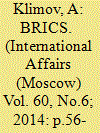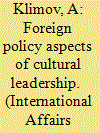|
|
|
Sort Order |
|
|
|
Items / Page
|
|
|
|
|
|
|
| Srl | Item |
| 1 |
ID:
138053


|
|
|
|
|
| Summary/Abstract |
UNTIL RECENTLY, many of those who speak and write about BRICS on a professional level were in a bit of a dilemma. Yes, over the past five years, the meetings of the heads of four (BRIC) and then five states (Brazil, Russia, India, China, and South Africa) seemed to be more like a political "club": a new platform for the discussion of global issues between the leading powers on the Eurasian, South American and African continents. Summit discussions were of an increasingly comprehensive nature, gradually expanding the agenda, but such facts in and of themselves did not as yet mean the formalization of a new association or alliance (although this was exactly what the media often referred to as the BRICS format).
|
|
|
|
|
|
|
|
|
|
|
|
|
|
|
|
| 2 |
ID:
180702


|
|
|
|
|
| Summary/Abstract |
THE FIVE MEMBER COUNTRIES of BRICS - Brazil, Russia, India, China, and South Africa - possess significant economic resources and are significant political actors. On January 1, 2020, BRICS' rotating one-year chairmanship passed over to Russia. The motto of the Russian chairmanship is "BRICS Strategic Partnership for Global Stability, Shared Security and Innovative Growth." But the business cultures of the five countries seriously differ from one another, and it is essential to launch discussions to prevent these differences from causing misunderstandings and consequent conflicts.
|
|
|
|
|
|
|
|
|
|
|
|
|
|
|
|
| 3 |
ID:
125034


|
|
|
|
|
| Publication |
2013.
|
| Summary/Abstract |
THE MINISTRY OF FOREIGN AFFAIRS was the first among the government agencies in Russia to start actively introducing automation into its work. This began in 1983, when the country's leadership launched a legal and regulatory framework for joint work and coordination of action by various departments to ensure entry to the USSR for an increased flow of foreign nationals. The urgency of the task became clear after the 1980 Moscow, Tallinn, Leningrad, Kiev and Minsk XXII Summer Olympic Games, when the number of participants, guests and spectators in Moscow alone exceeded 200,000.
|
|
|
|
|
|
|
|
|
|
|
|
|
|
|
|
| 4 |
ID:
155365


|
|
|
|
|
| Summary/Abstract |
A YEAR AGO, on May 5, 2016, the world mass media announced a one-of-its-kind concert by the Mariinsky Theater orchestra, conducted by Valery Gergiev, in the Syrian town of Palmira. Unfortunately, this ancient jewel of the East had become the hostage of the pseudo-Islamic "state" (ISIS, banned in the Russian Federation). So a miraculous appearance of the Russian performers in the heat of an atrocious war became a symbol of the inevitable victory of Good over Evil. This concert, given by outstanding envoys of the Russian culture at the world-renown UNESCO landmark, not only gave the people of Syria hope for a peaceful future - it also demonstrated to the world community our country's high humanistic mission and a creative nature of Russian foreign policy.
|
|
|
|
|
|
|
|
|
|
|
|
|
|
|
|
|
|
|
|
|